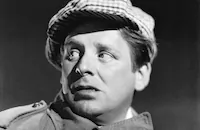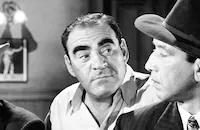Seven Days' Leave

Brief Synopsis
Cast & Crew
Tim Whelan
Victor Mature
Lucille Ball
Harold Peary
Mapy Cortes
Ginny Simms
Film Details
Technical Specs

Synopsis
Army privates Johnny Grey, Speak Jackson and Buddy "Clarky" Clark, who were members of the Les Brown band before their country called them to service, have not totally foresaken swing for soldiering. When Johnny's company is granted seven days' leave before shipping out, Johnny, Jackson and Clark attend a Les Brown concert, where Johnny renews his relationship with his old girl friend, band performer Mapy Cortes. While Johnny and Mapy dance, Bitsy, another private in their company, listens to The Court of Missing Heirs radio show and hears Johnny's name mentioned as heir to his great-grandfather's $100,000 fortune. Bitsy runs to the concert hall to notify Johnny who, overwhelmed by his good fortune, promises to buy Mapy a diamond engagement ring. Accompanied by Clark, Bitsy and Jackson, Johnny goes to New York to claim his inheritance. There, he meets Throckmorton P. Gildersleeve, the representative of the estate, who informs Johnny that a codicil to the will states that Johnny must marry a descendant of the Havelock-Allen family in order to collect his inheritance. Gildersleeve advises Johnny to arrange a business marriage, but Johnny is reluctant to comply until he meets Terry Havelock-Allen, the wealthy and glamorous elder daughter of the family. When Terry introduces Johnny to her fiancé, financial advisor Ralph Bell, Johnny is about to abandon Gildersleeve's scheme until Mapy presents him with her new trousseau and the bills to pay for it. To spend time alone with Terry, Johnny has Jackson, an amateur impressionist, lure Ralph out of town by impersonating Ronald Colman on the telephone requesting his financial advice. With Ralph out of the way, Johnny takes Terry on a date to a radio broadcast of Truth or Consequences , and Mapy, who is listening, hears Johnny and Terry introduced on the show. The next day, after Jackson tricks Ralph into traveling to Brookline, Massachusetts to meet with "Charles Laughton," Johnny takes Terry on a picnic. Johnny and Terry's day at the lake is capped by a passionate kiss, but after returning home that evening, Terry orders her butler to throw Johnny out of the house. Terry's younger sister Mickey then comments that Terry should marry Johnny and not Ralph. Meanwhile, Johnny visits Mapy, who accuses him of being in love with Terry. The next morning, Johnny is about to call off the deal when Mickey visits and announces that Terry is in love with him. Johnny rushes to Terry's side, and the couple decide to wed that night at the war relief party to be held at the Havelock-Allen house. At the party, before Johnny has the chance to tell Terry about the terms of his great-grandfather's will, Gildersleeve blurts out the details of their business arrangement, causing Terry to doubt Johnny's love and break their engagement. When Ralph arrives at the party, he sees Jackson perform his impressions and realizes that he is the voice of Ronald Colman and Charles Laughton. After Ralph slugs Jackson and Johnny, a fight ensues and the military police arrive and arrest Jackson, Bitsy, Clark and Johnny. The next day, the four remorsefully watch from their jail cell as their company ships out to Japan. All ends happily, however, when Mapy explains the situation to Terry, who then forgives Johnny. After Johnny and Terry are wed, the four privates rejoin their company aboard ship and sing farewell to their women beckoning from shore.

Director
Tim Whelan
Cast

Victor Mature

Lucille Ball

Harold Peary
Mapy Cortes

Ginny Simms
Freddy Martin
Les Brown

Marcy Mcguire

Arnold Stang
Lynn, Royce And Vanya
Ralph Edwards

Peter Lind Hayes

Walter Reed

Wallace Ford
Buddy Clark
Charles Victor
King Kennedy
Charles Andre
Harry Holman

Addison Richards
Sergio Orta
Willie Fung
Ronnie Rondell

Richard Martin
Frank Martinelli
Russell Hoyt
Henri Desoto
Charles Hall
Ed Thomas
Jack Gardner
Bob Lemon
Doug Evans

Ralph Dunn
Johnnie Morris
Allen Wood
Eric Wilton
Charles Flynn
Max Wagner
Ariel Heath

Mary Halsey
Julie Warren
Mary Stuart
Crew
George Arthur
C. Bakaleinikoff
William Bowers
Carroll Clark
Albert S. D'agostino
Ken Darby
Kenneth Earl
Robert De Grasse
Robert Guhl
Curtis Kenyon
Frank Loesser
Jimmy Mchugh
Michael Ohrenbach
Renié
Sam Ruman
Darrell Silvera
Ralph Spence
Vernon L. Walker
Charles Walters
Tim Whelan
Robert Wise

Videos
Movie Clip



Trailer
Film Details
Technical Specs

Articles
Seven Days' Leave
Seven Days' Leave stars hunky Victor Mature as Johnny, a soldier who learns that he's the heir to a family fortune, but must marry a woman from a rival family to collect it. In civilian life, Johnny was a trumpet player with Les Brown's band, which just happens to be performing in New York, providing plenty of opportunity for musical interludes (Buddy Clark, a popular radio singer and recording artist, provided Mature's singing voice, and plays a small non-singing role as one of Mature's pals). Lucille Ball, showing only glimmers of her screwball comedy future, is the lady in question, and their courtship takes place during the seven days of his leave, aided and abetted by his fellow men in uniform. At one point, the two go on a date to watch the radio program Truth or Consequences, and are picked to play the game. She has to take aim at him with a cream pie, and that's when you see her potential for comedy. According to several sources, Mature, who made the film on loanout from his home studio Fox, had wanted his current girlfriend Rita Hayworth for the role, and resented working with Ball. He made her life miserable during production by letting her know it. They later worked together amicably on another RKO film, Easy Living (1949).
Seven Days' Leave features the film debut of Arnold Stang, a bespectacled young radio comedian with a distinctive voice. Stang went on to work in television, most notably as a sidekick to Milton Berle. Also making her first movie was teen actress and singer Marcy McGuire, who plays Ball's sister, and Seven Days' Leave also includes the only American film appearance by Puerto Rican singer Mapy Cortes, who had a long and successful career in Mexican films.
B>Seven Days' Leave also marked another career debut, this one behind the camera. Pasadena-born Charles Walters had become a success as a dancer and choreographer on the New York stage, and had recently returned to California. He is credited with the film's "Dance Ensembles," including "Please Won't You Leave My Girl Alone," a rousing march by the soldiers; an energetic samba danced by Cortes and a plump soldier; and a comic Texas swing number for singing ingenue McGuire. A ballroom dance that goes hilariously awry by the team of Lynn, Royce and Vanya, wittily spoofing the swoopy style of Veloz and Yolanda, was apparently their own creation.
The critics offered faint praise for Seven Days' Leave. "If you stuff a grabbag with enough different items, some of them are bound to please," wrote the New York Times critic. "With rugged, dimpled, eye-rolling Victor Mature and the nearly as beautiful Lucille Ball to provide the romantic hide-and-seek, Seven Days' Leave is an unsteady melange. But on a thin tire the producers are still getting a little mileage. The audience seemed to enjoy the ride." The Brooklyn Eagle was more enthusiastic: "Loaded with music, hot, sweet and solid, Seven Days' Leave made a whole lot of local audiences happy." In spite of lukewarm reviews, the film was one of RKO's top moneymakers of 1942.
Walters and Ball were soon reunited. Thanks to Gene Kelly, who had known him in New York, Walters was hired to choreograph DuBarry Was a Lady (1943) starring Kelly and Ball, her first film under contract at MGM. It was the beginning of an enduring friendship. In the 1970s, Walters directed an episode of Ball's television series Here's Lucy, and two of her TV specials. DuBarry was also the beginning of Walters' long career at MGM, first as a choreographer and, beginning with Good News (1947), as a director.
Producer/Director: Tim Whelan
Screenplay: William Bowers, Ralph Spence, Curtis Kenyon, Kenneth Earle
Cinematography: Robert de Grasse
Editor: Robert Wise
Costume Design: Renie
Art Direction: Albert S. D'Agostino, Carroll Clark
Dance Ensembles: Charles Walters
Music: Songs by Frank Loesser and Jimmy McHugh
Principal Cast: Victor Mature (Johnny Grey), Lucille Ball (Terry Havelock-Allen), Harold Peary (Throckmorton P. Gildersleeve), Mapy Cortes (Mapy), Marcy McGuire (Mickey Havelock-Allen), Arnold Stang (Bitsy), Peter Lind Hayes (Speak Jackson), Walter Reed (Ralph Bell), Wallace Ford (Sergeant Mead), Buddy Clark (Buddy "Clarky" Clark)
87 Minutes
by Margarita Landazuri

Seven Days' Leave
Quotes
Trivia
Notes
The working title of this film was Sweet or Hot. Although most contemporary sources spell the surname of the Lucille Ball and Marcy McGuire characters as "Havelock-Allen," and it is pronounced that way within the film, in a close-up of an invitation to the garden party, the name is written as "Havalok-Allen." According to a news item in Hollywood Reporter, Harold Peary threatened to leave the cast unless his role as "Throckmorton P. Gildersleeve" was expanded. In December 1942, RKO launched a new series based on Peary's "Gildersleeve" character. For additional information about the series, consult the Series Index and see entry above for The Great Gildersleeve. This picture marked the American debut of Puerto Rican film star Mapy Cortes and the screen debut of Arnold Stang. A news item in Hollywood Reporter adds that RKO imported dance director Charles Walters from Broadway to work on this film. Walters later became a choreographer and director at M-G-M. Favorable audience reaction to Marcy McGuire won her a contract at the studio, according to another news item in Hollywood Reporter. RKO borrowed Victor Mature from Fox to appear in this picture. In the film, comedian Peter Lind Hayes impersonated popular actors Ronald Colman and Charles Laughton. The radio program Truth or Consequences debuted on the NBC radio network in 1940 and featured Ralph Edwards as the emcee. The premise of the show was that contestants must pay the consequences, usually performing a silly stunt, unless they tell the truth. In 1950, CBS began to broadcast the show on television. Edwards was also the emcee of the television version. The program, Court of Missing Heirs, had its debut on CBS radio in 1939 and featured Jim Waters as emcee. The program attempted to find heirs to large and small fortunes.

Miscellaneous Notes
Released in United States 1942
Released in United States on Video September 27, 1989
Released in United States 1942
Released in United States on Video September 27, 1989














